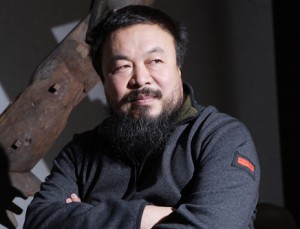Rushdie: Free Ai Weiwei
 Writing in The New York Times, Salman Rushdie calls on China to free dissident artist Ai Weiwei:
Writing in The New York Times, Salman Rushdie calls on China to free dissident artist Ai Weiwei:
Art can be dangerous. Very often artistic fame has proved dangerous to artists themselves. Mr. Ai’s work is not polemical — it tends towards the mysterious. But his immense prominence as an artist (he was a design consultant on the “bird’s nest” stadium for the Beijing Olympics and was recently ranked No. 13 in Art Review magazine’s list of the 100 most powerful figures in art) has allowed him to take up human rights cases and to draw attention to China’s often inadequate responses to disasters (like the plight of the child victims of the 2008 earthquake in Sichuan Province or those afflicted by deadly apartment fires in Shanghai last November). The authorities have embarrassed and harassed him before, but now they have gone on a dangerous new offensive.
On April 4, Mr. Ai was arrested by the Chinese authorities as he tried to board a plane to Hong Kong. His studio was raided and computers and other items were removed. Since then the regime has allowed hints of his “crimes” — tax evasion, pornography — to be published. These accusations are not credible to those who know him. It seems the regime, irritated by the outspokenness of its most celebrated art export, whose renown has protected him up to now, has decided to silence him in the most brutal fashion.
The disappearance is made worse by reports that Mr. Ai has started to “confess.” His release is a matter of extreme urgency and the governments of the free world have a clear duty in this matter.
Mr. Ai is not the only Chinese artist in dire straits. The great writer Liao Yiwu has been denied permission to travel to the United States to attend the PEN World Voices Festival of International Literature, which begins in New York on Monday, and there are fears that he could be the regime’s next target. Among the others are Ye Du, Teng Biao and Liu Xianbin — who was sentenced last month to prison for incitement to subversion, the same charge leveled against the Nobel Peace Prize laureate Liu Xiaobo, now serving an 11-year term.
The lives of artists are more fragile than their creations. ...
Click here to read the rest.

